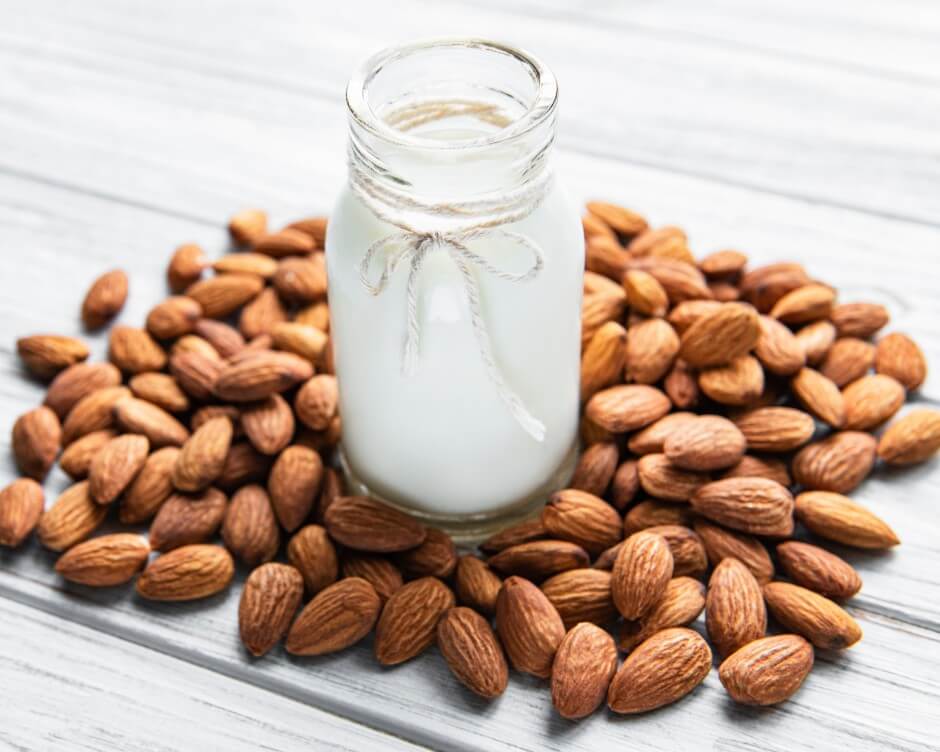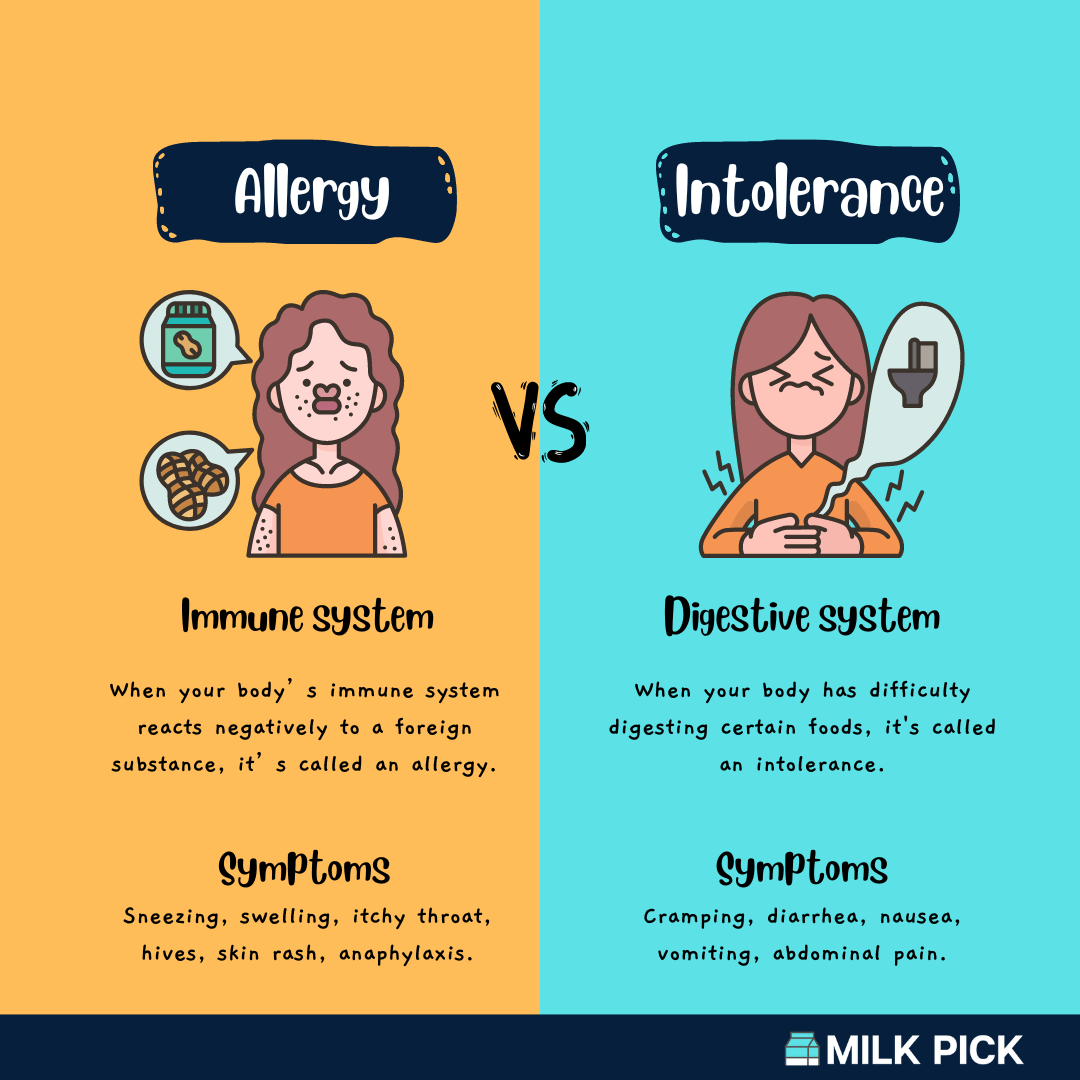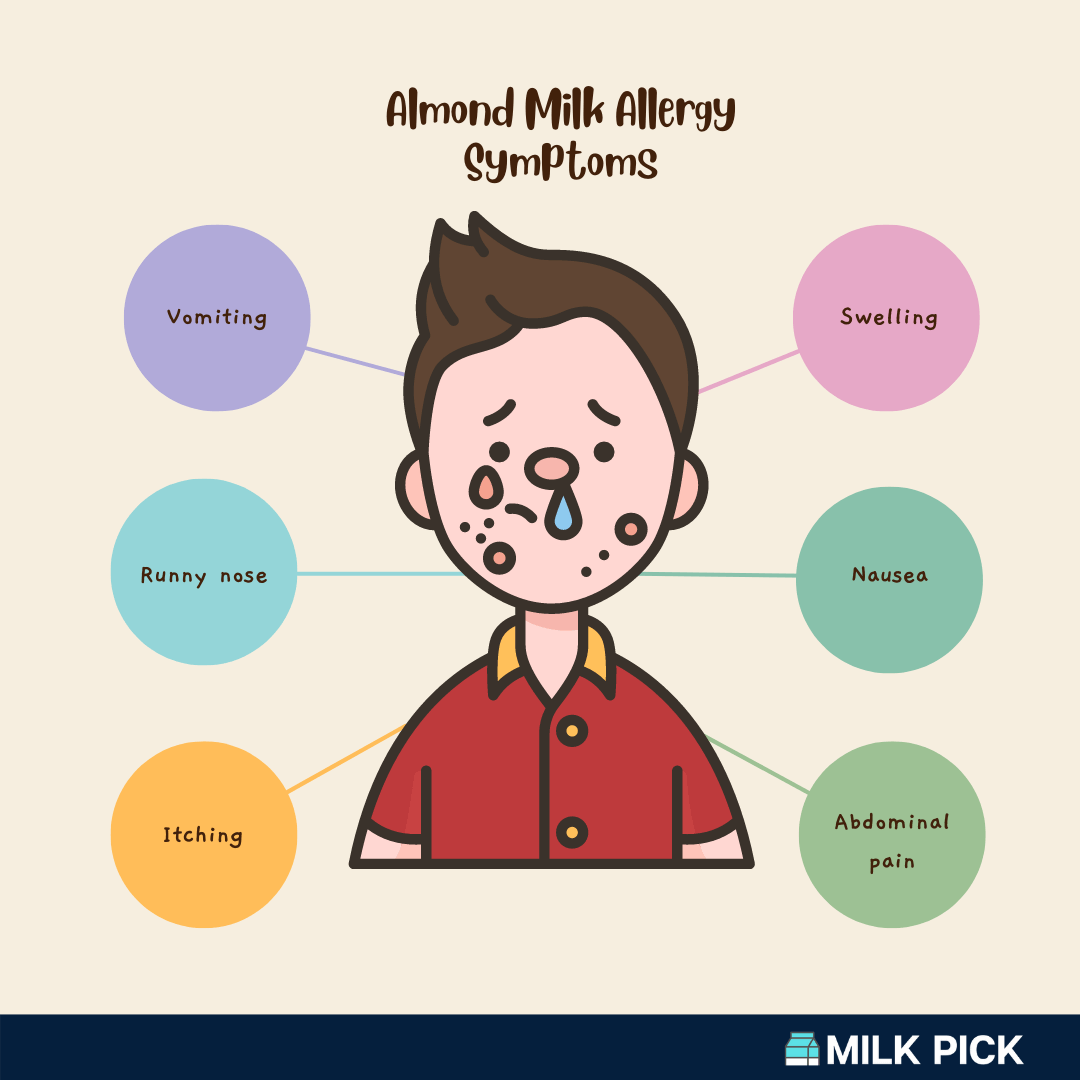Many types of almond milk contain other ingredients other than almonds and water, which you may find yourself allergic to, even if you’re not allergic to almonds! Therefore, you may find yourself allergic to almond milk and not almonds.
As nut milks become increasingly popular over time, you may find yourself allergic to some nut milks but not the nut itself. If you find that this is happening, it is likely that you are allergic to any ingredient in the almond milk, and not the almonds themselves.
Continue reading for more information on nut allergies, almond milk allergies, and more.
Can You Be Allergic to Almond Milk?
You can absolutely be allergic to almond milk. It is recommended that if you are allergic to tree nuts, specifically almonds, you do not drink almond milk, as you will likely have an allergic reaction.
Additionally, you may find yourself simply just allergic to almond milk. This is because store-bought almond milk may be highly processed.
Some almond milk contains many different additives that natural almonds do not have, resulting in many finding themselves allergic to almond milk but not almonds.

What’s the Difference Between an Allergy and Intolerance?
One of the first things we should discuss is the difference between allergies and intolerances. Although often confused, allergies are a completely different bodily reaction than an intolerance.

What is a Food Allergy?
When your body’s immune system reacts negatively to a foreign substance, it’s called an allergy.
Although most humans can outgrow allergies, they can also develop new ones over time.
Unfortunately, there isn’t much data available on what causes allergies. That being said, we do know that many people happen to develop allergies to tree nuts, such as almonds.
Almonds are in the top eight foods that people are allergic to, a list that also includes eggs, dairy, shellfish, peanuts, fish, wheat, and soy.
When it comes to allergies, food allergies tend to affect about 8% of children and 3% of adults, per the Mayo Clinic.
Allergic reactions can look completely different for everyone and can range from mild, to severe, to life-threatening.
Whenever you find yourself having an allergic reaction, you should always take it seriously, as your symptoms can develop and become more severe over time.
Some symptoms of allergic reactions include:
- Sneezing
- Swelling of your face and/or mouth
- Itchy throat
- Hives
- Eczema or other skin rashes
- Anaphylaxis
Out of these, anaphylaxis is the worst, as it includes the closing of your throat, racing of your heart, and difficulty breathing. If you find yourself experiencing this symptom, seek medical attention immediately.
Thankfully, there are many different treatments for allergies.
These can be in the form of an allergy shot, medication, or even supplementation which has been known to help reduce or even resolve some symptoms.
However, many find that the best way to treat their allergies is to simply avoid their triggers.

What is a Food Intolerance?
Having an intolerance to food will mainly look like gastrointestinal symptoms, like cramping, diarrhea, nausea, vomiting, abdominal pain, and more.
Those with food intolerances may find that they develop serious side effects over time if they happen to keep eating the foods they are intolerant to.
Many find themselves intolerant to lactose, gluten, fish, or even soy.
Can You Drink Almond Milk if You Are Allergic to Almonds?
If you are allergic to almonds, you should avoid almond milk whenever possible.
Almond milk, in its most basic form, is made from almonds and water.
More processed almond milk may contain other ingredients that may also cause you to react.
Allergic reactions from almond milk can be seen around the mouth and on the skin.
If you have an almond allergy, you will likely develop an itchy rash or hives after you have eaten almonds. This can happen after drinking almond milk, as well.
If you believe you're allergic to almond milk, you should watch out for these common symptoms and talk to your doctor:
- Swelling
- Nausea
- Abdominal pain
- Runny nose
- Vomiting
- Itching

Can You Drink Almond Milk If You Have a Tree Nut Allergy?
If you have a tree nut allergy, you should avoid drinking almond milk, as almonds are one of the most common tree nut allergies you can have.
Tree nut allergies can be hard to narrow down, so if you don’t know what specific nut you’re allergic to, it’s safe to avoid milk made from tree nuts altogether.
That being said, if you happen to know which nut you should avoid, and you know that almonds are okay for you to have (per your doctor), almond milk should be safe to consume!
Can You Be Allergic To Almond Milk But Not Almonds?
If you find yourself not allergic to almonds, but still have reactions to almond milk, you may be allergic to ingredients in the almond milk and not the almonds!
Many popular brands of almond milk contain a list of ingredients including:
- Calcium carbonate
- Gellan gum
- Sea salt
- Sugar
- Vitamin A palmitate
- Vitamin D2
- Water
- Potassium citrate
- Sunflower lecithin
If you buy sweetened or flavored almond milk (e.g. vanilla or chocolate almond milk), it will have even more ingredients.

What to Do If You're Allergic to Almond Milk
If you react to almond milk but not almonds themselves, you are likely allergic to one of the ingredients in almond milk listed above.
If you're allergic to almond milk, we suggest looking for almond milk with minimal ingredients—ideally just water and almonds.
Some of our favorite brands are:
Your other option is to avoid drinking almond milk altogether. However, if you plan to switch to another type of non-tree nut milk like soy milk, oat milk, or pea milk, realize that some of these milks may contain the same additives that are causing your allergic reaction.
Additives in Almond Milk to Avoid
Other than the ingredients listed in the previous section, almond milk may also have a thickening agent, carrageenan, included. This ingredient has been known to cause some people gastrointestinal distress.
If you find that this ingredient causes you discomfort, try organic almond milk or one of the brands mentioned above.
Carrageenan was removed from the organic foods list and cannot be used in any organic foods.
The additives included in many almond milk varieties can also cause:
- High blood pressure- Sweetened almond milk can have a high level of sugar, which can contribute to high blood pressure, inflammation, obesity, heart disease, and more when consumed in large quantities over time.
- Skin reactions- One of the most common signs of an almond milk allergy is skin reactions such as hives, itching, or eczema.

Can Babies Be Allergic to Almond Milk?
Because almond milk has grown in popularity, you may find yourself wondering if babies can be allergic to almond milk.
Although many babies are not allergic to almond milk, many say that almond milk should not be given to babies at all.
Babies who are under the age of 12 months should only be given breast milk or infant formula, and children 1 years and older should only drink cow’s milk, according to the American Academy of Pediatrics.
Conclusion
Even if you’re not allergic to almonds, you may find that you are allergic to almond milk.
This is because almond milk can be processed with many different additives, any of which you can be having a negative reaction to.
If you find that you are having negative reactions to almond milk, it is suggested that you talk to your doctor about an allergy test as well as how best to avoid the ingredients you are allergic to.
Thankfully, there are so many great alternatives to almond milk on the market today, including soy milk, rice milk, hemp milk, oat milk, and flax milk.
If you find that you are allergic to almond milk and wish to find a better plant-based alternative, there are so many to choose from.
That being said, if you find that you are truly allergic to almond milk and not almonds, take care in looking at ingredients in all plant-based milk to ensure you are not consuming ingredients that you’re allergic to.
